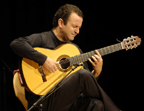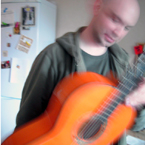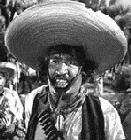Welcome to one of the most active flamenco sites on the Internet. Guests can read most posts but if you want to participate click here to register.
This site is dedicated to the memory of Paco de Lucía, Ron Mitchell, Guy Williams, Linda Elvira, Philip John Lee, Craig Eros, Ben Woods, David Serva and Tom Blackshear who went ahead of us.
We receive 12,200 visitors a month from 200 countries and 1.7 million page impressions a year. To advertise on this site please contact us.
|

|
|
RE: Bulerías basic timekeeping.
|
You are logged in as Guest
|
|
Users viewing this topic: none
|
|
|
[Poll]
|
Bulerías basic timekeeping.
|
| Marking a steady beat in 2's (2,4,6 etc)? |
|
| "Al Golpe" (1,2 - 4,,5 - 7,8 - 10,11)? |
|
| Marking the accented beats (3,6,8,10,12 or 7,8)? |
|
| A combination of the above |
|
Total Votes : 66
|
|
(last vote on : Nov. 6 2019 16:01:41)
|
|
Login  | |
|

   
zata
Posts: 659
Joined: Jul. 17 2003

|
 RE: Bulerías basic timekeeping. (in reply to Guest) RE: Bulerías basic timekeeping. (in reply to Guest)
|
|
|
“I think you are missing the point.
Experienced singers will set the
rhythm and their voice dictates
what is going on.”
As always, God is in the details. The singer sets the rhythm and works the compás as he or she sees fit, not in units of twelve, but as accents. A singer’s concept of the rhythm and the compás does not, at any moment, cease to rule (in standard flamenco, and as long as the singer is actually singing). Catching the first “1-2-3” does not free the guitarist to travel merrily down the lane of his own creative concepts, but rather he must be taking a reading every second. Right now envision a traditional set of singer and guitarist: the singer is intently into his or her own moment, nearly always with closed eyes – the guitarist leans over his guitar and stares intently at the singer. It’s not a mere tradition, but an absolute necessity which reflects the dynamic of traditional cante. I keep emphasizing “traditional” or “standard” because studio flamenco, which has become so popular, makes its own rules.
“Good singers will know how to reflect
compas with rhytmic ideas. This is what
is meant by singers who sing "in" compas
or "out" of compas. “
Twixt the cup and the lip is the limbo where a guitarist using Ricardo’s system, which is viable but different, imposes his own concept of what he believes the singer really means, or ought to do...just like Ricardo Pachón believes Antonio Mairena couldn’t sing in compás. I’m not theorizing. At fiestas you sometimes come across amateur guitarists who haven’t had experience accompanying. In those situations a singer can either decide to follow, just to get through the moment and not spoil the party or simply stop singing.
”Ricardo- I'll never agree with you again.”
You don’t need to agree with him or anyone else. There are realities anyone can learn by accompanying a variety of singers in a variety of situations, and lots of observation. I just watched the María la Sabina episode of Rito y Geografía with my morning coffee. Her compás is amazing, and not a twelve in sight. The primitive guitarist accompanies her as closely as a limpet clings to a rock. Ricardo would tell us she couldn’t sing in compás.
_____________________________
Estela Zatania
www.deflamenco.com
www.expoflamenco.com
|
|
|
|
REPORT THIS POST AS INAPPROPRIATE |
Date Dec. 14 2006 9:40:12
 |
|

   
Ricardo
Posts: 14825
Joined: Dec. 14 2004
From: Washington DC

|
 RE: Bulerías basic timekeeping. (in reply to zata) RE: Bulerías basic timekeeping. (in reply to zata)
|
|
|
quote:
You can’t possibly think it has to do with the words.
That was about the colatilla tiritran thing. And NO I don't. That is why I brought it up. 
quote:
Cante works over what Spanish musicians call a “colchón” (I don’t know what that is in English, perhaps ‘drone’?),
Calchon is like a mattress for a bed. The cante would "lie" on top. But in music that Calchon could be like rasgueados on the guitar. It supports underneath very clear. But rhythm in flamenco is more than just strumming and marking accents. The rhythm of a melody, be it falseta or cante, is intrinsicly tied to the base rhythm. In that way, one can imply the other if it is not there. Cante works not only on top of rasgueados, but also with palmas,or foot only. And, if need be, with nothing at all, just the feeling inside. Know what that feeling is, is how an accompanist can "read" a singer and follow him. Especially a singer who does not do palmas when singing.
quote:
You’ve invented a system that works for you and your circle of regulars,
I have done no such thing.
quote:
does not free the guitarist to travel merrily down the lane of his own creative concepts, but rather he must be taking a reading every second.
I Never said nor implied anything like that. Sheesh. What do you suppose the guitarist is "reading", if not the melody of the singer? That would be the notes or tones, and the RHYTHM. That is what makes a melody. You keep implying that rhythm for a singer is different for the singer than a guitarist. Then how would any guitarist know or care what to "read" from the singer? (not talkng about 12 count or compas limits, just rhythm). You made it clear the guitarist can't go on his own rhythm and the singer sings to it. I agree. So what rhythm is he going by if not the singers? And you mentioned a guitarist that did not follow, the singer had to "follow him"? So, how COULD the singer even do that by the same logic, if he had different concept of rhythm than the guitarist?
In any case, guitar accompanists DO have a lot of creative freedoms anyway, in regards to accents and chords he likes to use. Diffferent approach for the same letra or singer than another guitarist. That is part of a guitarist's personal style and why Parrilla sounds different than Habichuela when accompanying. The thing they understand, is how the cante melody fits to what they play, and can adjust according to the singer if the singer does it different too, while still keeping their own style.
Have you never seen a singer sing fuera compas? Ever? And if they did, would you say it is totally ok because the singer is allowed to have their own rhythm? Do you think Paquera sings bulerias however she pleases and cares nothing about the accents and rhythm of Parilla or palmas?
quote:
Ricardo would tell us she couldn’t sing in compás.
I never said any such thing. Or do you mean Pachon? And did he ever say that? Maybe there is a specific thing of Mairena he did not like? Not fair to speak from someone elses view point.
|
|
|
|
REPORT THIS POST AS INAPPROPRIATE |
Date Dec. 14 2006 17:18:49
 |
|

   
Ricardo
Posts: 14825
Joined: Dec. 14 2004
From: Washington DC

|
 RE: Bulerías basic timekeeping. (in reply to Ron.M) RE: Bulerías basic timekeeping. (in reply to Ron.M)
|
|
|
quote:
(Keep watching the foot throughout!..)
When you are playing, you don't want to have to think about it. I guess you can put Gerardo in the category with Vicente and Sanlucar, although, the majority of the time Gerardo was doing 12,2,4, etc. The alzapua he clearly felt in 3s, 12,3,6,9, but he is certainly not relying on his foot tap as you pointed out. It is just a feeling of where you might feel an emphasis. Notice he almost gets into 1,2, 4,5,7,8 etc, but then quickly abandon's it for an accent. I dont' think he is very aware, just whatever feels good.
For the record, when TEACHING in class, Gerardo will keep the foot going when we are first learning how it is supposed to feel, either 12,2,4, 12,3,6, or the accents, depending on how he wants us to feel it. It is a good tool for communicating rhythm, once you understand what it means.
Ricardo
|
|
|
|
REPORT THIS POST AS INAPPROPRIATE |
Date Dec. 15 2006 22:57:32
 |
|

  
Anders Eliasson
Posts: 5780
Joined: Oct. 18 2006

|
 RE: Bulerías basic timekeeping. (in reply to zata) RE: Bulerías basic timekeeping. (in reply to zata)
|
|
|
quote:
For the record, when TEACHING in class, Gerardo will keep the foot going when we are first learning how it is supposed to feel, either 12,2,4, 12,3,6, or the accents, depending on how he wants us to feel it. It is a good tool for communicating rhythm, once you understand what it means.
This more or less gives me a feeling on how things work. That the tapping is in order to learn, to teach and some times to communicate. Teach yourself by tapping and then later on let it go and play. (MHO)
I cant understand how you can only communicate in flamenco by SEING the foot tapping as Estela said some pages ago. This would meen that blind people would not be able to play flamenco with others??? In this case it would be the only music form I´ve heard of where blind people cant join the show.
_____________________________
Blog: http://news-from-the-workshop.blogspot.com/
|
|
|
|
REPORT THIS POST AS INAPPROPRIATE |
Date Dec. 16 2006 8:21:17
 |
|

   
Ron.M
Posts: 7051
Joined: Jul. 7 2003
From: Scotland

|
 RE: Bulerías basic timekeeping. (in reply to duende) RE: Bulerías basic timekeeping. (in reply to duende)
|
|
|
quote:
for example the alzapua intro off Almoramia (PDL) feels good in both 12,2,4,6 etc AND 12,3,6,8,10.
Yeah Henrik,..
But Paco's doing that for effect!
Every real Flamenco guitarist I've ever met are more than capable of supplying their own "foot-compás".
(Same as Ricardo is saying)
So that, in itself is a lesson to everyone here.
BTW..
Does anybody remember that great movie "The Jerk"?
Steve Martin is lying in his little bed out in the sticks, when the crackly radio starts broadcasting Swing/Jazz from Chicago...
Suddenly his foot gets a "twitch" and he has to get out of bed and start to dance...
It's the first time he's ever been exposed to rhythm...
He tries to stop it...but he can't.
His "dancing" foot leads him all around the room and he tries to stop it and hollers out for help, 'cause he doesn't know what's happening to him.
Now that is a truly independant foot! LOL!  
cheers
Ron
PS...One of the other bits of the movie I loved, was when his Dad was having a heart-to-heart in the yard with his son who was leaving the family home to make his own way in the World saying..
(Taking some Dollars from his wallet)...
See This son...It's called Moula....Got it?
Then pointing at some Dog **** in the yard....
He says..
And that's called Dogshit.... got it?
Steve says..
OK... I think I got it....
That's moula....and thats dogshit!!
The proud Father claps him on the shoulder, for a wisdom-lesson learned.
I could go on and on over this movie, where he writes back home to his Mom and Dad and says..
"I met this really nice girl at the Chicago Funfair....She's really cool and has this Tattoo below her stomach that says "Warning!..Slippery When Wet!"
She did this thing to me called ..."A Blowjob".
I think I'm gonna do this A LOT!....
From Chicago...
Your Loving Son..."

You gotta see it..if you haven't already!
If you haven't then get it this Chirstmas Hols!
cheers
Ron
_____________________________
A good guitar might be a good guitar
But it takes a woman to break your heart
|
|
|
|
REPORT THIS POST AS INAPPROPRIATE |
Date Dec. 16 2006 20:29:56
 |
|

   
zata
Posts: 659
Joined: Jul. 17 2003

|
 RE: Bulerías basic timekeeping. (in reply to Ricardo) RE: Bulerías basic timekeeping. (in reply to Ricardo)
|
|
|
Sorry for the delay, I’m in Cádiz for a few days, not much free time. I’ve tried to keep this orderly, hope it’s not too confusing.
quote:
That was about the colatilla tiritran thing. And NO I don't. That is why I brought it up.
I spoke about the Cádiz custom of using the voice as a percussive instrument. It was you asked if words could change the compás. The answer is no.
quote:
Cante works over what Spanish musicians call a “colchón” (I don’t know what that is in English, perhaps ‘drone’?),
quote:
Calchon is like a mattress for a bed.
:-)...right, colchón...:-)... And it’s the musical term for what I’ve since confirmed in English is a ‘drone’, so we’ve all learned something.
quote:
The cante would "lie"on top. But in music that Calchon could be like rasgueados on the guitar. It supports underneath very clear.
A colchón is like what Arcángel does when he sings tonás accompanied by a single continuous note which resembles the sound of a cellist drawing his bow slowly across one string over a period of several minutes. Strummed chords can be a colchón as well, provided no rhythmic structure is imposed.
quote:
But rhythm in flamenco is more than just strumming and marking accents.
The colchón, by definition, imposes neither accents nor rhythm, it’s a harmonic backdrop. In basic cante (obviously other palos are different), the guitarist works percussively with rhythm and compás, harmonically with a drone. If you were to sing siguiriyas, you would immediately see how the singer is free to whip up melodies, and they will always sound “right” provided the guitarist isn’t trying to second-guess the singer. If there’s going to be a resolution in Do or Sol as some siguiriyas de cambio have, there is no choice but to wait for the singer to actually express the intervals that require those chords. To detect the precise moment, you have to cling to the singer’s every breath and of course, have visual contact, because the singer’s compás is what rules. Your surprise that singer and guitarist could not interact if they could not see each other indicates you don’t adhere to this arrangement.
quote:
The rhythm of a melody, be it falseta or cante, is intrinsicly tied to the base rhythm.
In popular music and many flamenco forms (guajira, petenera corta, alegrías, colombiana, farruca, etc...) this is true. I tend to think of cante as the basic trinity of soleá-siguiriyas-bulerías where the colchón is the base and the above statement doesn’t apply for cante as it does for guitar. In fact, I now think I’m to blame for creating a misunderstanding, because I was only considering basic cante, which somehow seems more “real”, but that’s a personal and unfair judgement.
quote:
In that way, one can imply the other if it is not there.
This is the flaw. With a competent singer, no guitarist has the authority to determine if the compás is “there”, at least in basic cante (as opposed to other cantes which function like pop music). “Not there” is your own subjective opinion, which as guitarist, is irrelevant during the cante. I know it sounds despotic and unfair, but the system works and is used by traditional interpreters. (Now it occurs to me you might mean in between letras when the singer isn't singing, in which case, disregard).
quote:
Cante works not only on top of rasgueados, but also with palmas,or foot only. And, if need be, with nothing at all, just the feeling inside. Know what that feeling is, is how an accompanist can "read"a singer and follow him.
It doesn’t work like that in practice. “The feeling inside”...but that’s the singer’s “inside”, not yours, and this brings us back to the metronome test which shows that not only compás, but even rhythm is perceived in different ways at different moments by different people, and cante has evolved in such a way that the singer commands. And this is turn is why the absence of eye contact makes basic cante impossible to accompany except in the jukebox sense where singer and guitarist would go through set motions. I’m almost certain it’s not possible to discuss this issue in writing.
quote:
You’ve invented a system that works for you and your circle of regulars.
quote:
I have done no such thing.
You think you’re being a good samaritan when you help or fill out or correct the singer’s compás, but that can only by justified with inexperienced singers.
quote:
does not free the guitarist to travel merrily down the lane
of his own creative concepts, but rather he must be taking
a reading every second.
quote:
I Never said nor implied anything like that. Sheesh.
What do you suppose the guitarist is "reading", if not
the melody of the singer? That would be the notes
or tones, and the RHYTHM. That is what makes a melody.
“Taking a reading” means monitoring one fraction of a step *behind* the singer, fine-tuning the accompaniment every second.
quote:
You keep implying that rhythm for a singer is different for the singer than a guitarist.
No, I’m not implying it, I’m stating it flatly because it’s what I’ve observed over the second half of the twentieth century singing, playing guitar and dancing, and the concepts I’ve tried to express are what allow me to interact with other interpreters which is important to me....blind obedience to form is what lets the creative juices flow freely. You can’t imagine how different it feels to sing freely or sing being "bullied" by a guitarist who no doubt thinks he’s being helpful.
quote:
Then how would any guitarist know or care what to "read"from the singer?
To accompany well you have to read, and then react appropriately to that reading.
quote:
In any case, guitar accompanists DO have a lot of creative freedoms anyway, in regards to accents and chords he likes to use.
Accents don’t matter as long as there’s compás, but ill-advised chords can be very restrictive. One night a singer may weave a melody the guitarist thinks would sound good with an unusual alternative chord, and it sounds great. The next night, if the guitarist plays that same chord in the same spot, it might not sound as cool as the night before if the singer modifies the melody, and a dilemma is born. Does the singer charge through the cante and pay no attention to the guitarist, or try duplicate the melodic modification of the previous night? Few contemporary accompanists realize how confining this is, Marote spoke at length about this. One of the greatest guitarists his time, admired by everyone from Paco de Lucía “on down”, said he could no longer play for singers under a certain age because they needed to hear specific chords he didn’t use.
quote:
The thing they understand, is how the cante melody fits to what they play, and can adjust according to the singer if the singer does it different too, while still keeping their own style.
That’s close to correct. Great accompanists know the melodies of traditional cantes but never impose how they “fit”. Knowing the melodies gives them a jump-start so they’re always primed to back up the cante just right. If you play for a cuplé por bulerías you never heard before, you won’t have any problem with compás, but the chances of getting the chords right are small.
quote:
Have you never seen a singer sing fuera compas? Ever? And if they did, would you say it is totally ok because the singer is allowed to have their own rhythm? Do you think Paquera sings however she pleases and cares nothing about the accents and rhythm of Parilla?
Paquera did not follow Parrilla or Morao or anyone else. Without compás, there’s nothing, but compás is not the absolute value you think it is. It is in constant flux, and as a guitarist you don’t get to impose your personal concept of compás at a given moment. Cantes like siguiriya have much more leeway for “creative phrasing”, but even a clippy Jerez bulerías does flux, that’s where the metronome test comes in, and it’s the reason a guitarist cannot accompany a singer, except in a limited “song” sense, unless he can see the singer.
quote:
Ricardo would tell us she couldn’t sing in compás.
quote:
I never said any such thing.
I know you didn’t, that’s why I used the conditional tense.
_____________________________
Estela Zatania
www.deflamenco.com
www.expoflamenco.com
|
|
|
|
REPORT THIS POST AS INAPPROPRIATE |
Date Dec. 17 2006 1:21:09
 |
|

   
mrMagenta
Posts: 942
Joined: Oct. 25 2006
From: Sweden

|
 RE: Bulerías basic timekeeping. (in reply to zata) RE: Bulerías basic timekeeping. (in reply to zata)
|
|
|
Ok, a bit off topic now.
I'm by no means a flamenco expert, so I'm just writing as a fan of folk music, whatever form.
There is nothing at fault with the principle of reading/following the singer, while she/he is singing, just as Estela writes. However, I've seen many performances that have been spoiled by despotic attitutdes and big heads. Where, however nice things may sound, you're just not enjoying it. Now that's an altogether different thing.
If musicians won't give eachother room things will feel uneasy.. (IMO) flamenco is at its best when there is a tangible equality between its parts, and theese boost eachother, as opposed to some whizz seating herself/himself upon the whole performance. These attitudes are sensed!
I saw a show with Israel Galvan that had a sense of equality between Israel, Terremoto and Alfredo. Israels name was ten times larger on the poster, but the layout of the show gave room for all, thus also making Israels dancing come out better. However, this would quickly go bad if it all served just that one, large poster ego.
In bulgarian kaval music, a flutist plays a single drone note, while the other flutist plays an improvized part (Ezgija), then after the solist is done.. if the roles don't reverse you'll end up missing out on a whole dimension.
In flamenco there is ample space for the singer, the guitarist and the dancer. I don't see the need of any one to have the lionshare of the right of expression. I'm sure this isn't what you're saying, but the with words like despot and drone, I just had to state my rabid leftist, guitar-biased opinion! :)
|
|
|
|
REPORT THIS POST AS INAPPROPRIATE |
Date Dec. 17 2006 7:08:23
 |
|

   
Ricardo
Posts: 14825
Joined: Dec. 14 2004
From: Washington DC

|
 RE: Bulerías basic timekeeping. (in reply to zata) RE: Bulerías basic timekeeping. (in reply to zata)
|
|
|
quote:
It was you asked if words could change the compás.
No, I never asked. I was trying to point out the the melody and rhythm was more or less the same thing, lack of actual lyrics did not suddenly make it more percussive, or more "rhythmic" than every other type of cante. Perhaps you think when I say rhythmic, i mean "percussive"? I dont' by the way. A melody can have rhythm and not be percussive. A "percussive" melody would be a weird thing, unless it was mutted or very staccato.
About Calchon/drone. Well, there would be no point for the guitarist to change chords at all, if the accompanysit's job was to simply supply a drone. That is what a drone is, the fundamental tonic. Modal music is based on this. Modal music, or any music with drones implies NO HARMONY or NO CHORDS. Flamenco surely mixes the ideas of east and west in this respect. The idea that a flamenco singer can some how signal a chord change, defies the point of modality. So to me, calchon is chords, and chords are not a drone. But man is that off topic! 
quote:
I tend to think of cante as the basic trinity of soleá-siguiriyas-bulerías where the colchón is the base
Well, I think what you are getting at is that you think of the cantes in phrygian (vs major or minor keys) as more modal (need drone), which is fair. Could put tientos in there too, but then it is not a trinity is it? Anyway, that is you, but I don't make that distinction. I still consider anything where you have chord changes mixed in, it is using tonality. And in terms of rhythm of the cante, which is a separate thing from the way it is harmonized, it does not matter. Cante can be sung to palmas only. My point is that a palmero could "find the beat" when hearing cante, just as easy (if the palmero understands the melody) as the singer could sing to palmas that had already started. Likewise, a guitarist can pick up on the rhythm of the singer, without first having to see his or her foot. I say as easy for Solea as Alegrias.
quote:
“The feeling inside”...but that’s the singer’s “inside”, not yours,
Sorry, but as an accompanist, I try to make that feeling "mine" too. If not, how are we EVER together?
quote:
cante has evolved in such a way that the singer commands.
I have never said the guitarist leads. My point always was that the guitar follows, follows the RHYTHM of the singer. And the tones. "base cante" or "alegrias", does not matter which. But the guitarist has to KNOW what it is the singer is doing rhythmically. There are lots of indicators in the voice, lots of guitarists can sing too. Surely the better accompanists can at least sing stuff in rhythm, even if they don't have a nice voice.
I admit there is a lot of helpful clues to SEE in the body language of the singer, perhaps the foot, but mainly the face. But ultimately it is what is comming out of the mouth, the MELODY that dictates what the accompanist does.
quote:
You think you’re being a good samaritan when you help or fill out or correct the singer’s compás, but that can only by justified with inexperienced singers.
Then what would it be, compas wise, that an "experienced" singer has over an inexperienced one? Especially, if singers are free to interpret as they like with "base cante"? For the record, I tend to not do that, but was just giving an example. If there is a "wrong" way to sing rhythmically, then there must be a "right way", that is my point.
quote:
“Taking a reading” means monitoring one fraction of a step *behind* the singer,
"fraction of a step"? That is somehow NOT related to rhythm?
quote:
Without compás, there’s nothing, but compás is not the absolute value you think it is. It is in constant flux,
You keep bringing up the metronome "test", but that is regarding TEMPO only, just a part of what compas and rhythm means. I never said the guitarist imposes his rhythm to the singer, I am saying the singer can even FLUX as you say, the tempo, based on the RHYTHM of his melody. THAT is something the guitarist needs to understand and READ, in order to NOT impose his own personal tempo. Final point being the Cante has RHYTHM that is felt from inside and expressed outward in the melody.
quote:
Blind guitarists can be followed but not follow.
This gets the crux of our differing point of view. I admit that there are helpful things to observe visually, especially the face, but the melody itself, the notes and rhythm coming out of the singer's mouth, is the main thing. A blind guitarist who understands cante COULD possibely accompany better than a seeing guitarist who does not know it as well, and just keeps time by watching a singers foot. Likewise a blind singer can follow a metronomic guitarist's chords, without needing to see his foot. I am sure there are some excellent blind accompanists around. And I think it is a very unfair general statement to make.
Ricardo
|
|
|
|
REPORT THIS POST AS INAPPROPRIATE |
Date Dec. 17 2006 9:49:22
 |
|

   
zata
Posts: 659
Joined: Jul. 17 2003

|
 RE: Bulerías basic timekeeping. (in reply to mrMagenta) RE: Bulerías basic timekeeping. (in reply to mrMagenta)
|
|
|
quote:
If musicians won't give eachother room things will feel uneasy.. (IMO) flamenco is at its best when there is a tangible equality between its parts,
This is gratuitous speculation that negates the entire evolution of cante as we know it. There's no mechanical or physical reason why such a system would not work, but it would change the nature of cante, just as a profusion of extended and passing chords has changed the nature of what young singers sing (discussed in the post that alludes to Marote).
quote:
I saw a show with Israel Galvan that had a sense of equality between Israel, Terremoto and Alfredo. Israels name was ten times larger on the poster, but the layout of the show gave room for all, thus also making Israels dancing come out better. However, this would quickly go bad if it all served just that one, large poster ego.
"Edad de oro", a great show. Rehearsed works can and do do whatever they want. The dancer says to whistle Dixie after the 14th beat, you do it. Also, Israel is a dancer, not a singer...we were discussing the need for the cante to rule. In a natural setting, a dancer occupies the second spot in the existing hierarchy of cante-dance-guitar.
quote:
I don't see the need of any one to have the lionshare of the right of expression. I'm sure this isn't what you're saying, but the with words like despot and drone, I just had to state my rabid leftist, guitar-biased opinion! :)
It's exactly what I'm saying, but since I didn't invent the system I beg the messenger not be shot. Good accompanists are happy to coddle the singer just as an attentive lover is happy to be "used". They still get to shine in the in-between parts, and it's rare to see a cante recital where the guitarist doesn't get at least one applause in response to a falseta or other meaningful moment.
_____________________________
Estela Zatania
www.deflamenco.com
www.expoflamenco.com
|
|
|
|
REPORT THIS POST AS INAPPROPRIATE |
Date Dec. 17 2006 13:17:11
 |
|

   
zata
Posts: 659
Joined: Jul. 17 2003

|
 RE: Bulerías basic timekeeping. (in reply to sonikete) RE: Bulerías basic timekeeping. (in reply to sonikete)
|
|
|
quote:
Inspiration is usually more the reason than a big ego for cutting off a falseta or shortening the compas when it comes to singers. And even if it might feel like abuse against the guitarist, the job he has is to accompany the singer, nothing else except inspire the singer and play falsetas when they forget the lyrics.
Yes, that's the most realistic description so far, it reflects what goes on at those moments.
When a singer cuts off a falseta, that's rude, but it's forgiven instantly. If you notice, it tends to be older, more instinctive singers who do this, such as Borrico or Periñaca...these are people who developed their cante for decades without accompaniment and don't know how to act with a guitarist. What does "falseta" mean to them?
Since compás is perceived as an infinite circle, "shortening" and "lengthening" are irrelevant terms. Compás is accents.
_____________________________
Estela Zatania
www.deflamenco.com
www.expoflamenco.com
|
|
|
|
REPORT THIS POST AS INAPPROPRIATE |
Date Dec. 17 2006 13:27:34
 |
|
 New Messages New Messages |
 No New Messages No New Messages |
 Hot Topic w/ New Messages Hot Topic w/ New Messages |
 Hot Topic w/o New Messages Hot Topic w/o New Messages |
 Locked w/ New Messages Locked w/ New Messages |
 Locked w/o New Messages Locked w/o New Messages |
|
 Post New Thread
Post New Thread
 Reply to Message
Reply to Message
 Post New Poll
Post New Poll
 Submit Vote
Submit Vote
 Delete My Own Post
Delete My Own Post
 Delete My Own Thread
Delete My Own Thread
 Rate Posts
Rate Posts
|
|
|
Forum Software powered by ASP Playground Advanced Edition 2.0.5
Copyright © 2000 - 2003 ASPPlayground.NET |
0.109375 secs.
|


 Printable Version
Printable Version















 .
.  New Messages
New Messages No New Messages
No New Messages Hot Topic w/ New Messages
Hot Topic w/ New Messages Hot Topic w/o New Messages
Hot Topic w/o New Messages Locked w/ New Messages
Locked w/ New Messages Locked w/o New Messages
Locked w/o New Messages Post New Thread
Post New Thread